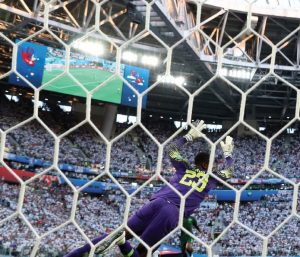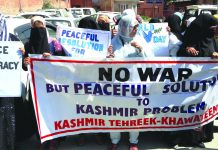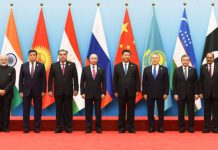 When I summed up in my first write-up for Tehelka titled “FIFA World Cup 2018: Football fever grips the globe” that “there are no clear favourites in this tournament”, little did I know that the article would prove prophetic. The FIFA World Cup 2018 that is underway in Russia is generating a flurry of excitement and has become the most viewed event in the history of sports, and a big reason for that may be the excitement about the possibility that new teams could spring surprises and spoil the chances of traditional favourites.
When I summed up in my first write-up for Tehelka titled “FIFA World Cup 2018: Football fever grips the globe” that “there are no clear favourites in this tournament”, little did I know that the article would prove prophetic. The FIFA World Cup 2018 that is underway in Russia is generating a flurry of excitement and has become the most viewed event in the history of sports, and a big reason for that may be the excitement about the possibility that new teams could spring surprises and spoil the chances of traditional favourites.
The writing on the wall was clear when Iceland, the smallest nation ever to play in the World Cup stalled the advances of Argentina in a 1-1 draw with Lionel Messi missing a penalty. Iceland is a country of just 3.5 lakh population and most of their football players are sort of part time footballers as their full time avocations are different. Croatia, whose golden generation which includes star names such as Modric, Rakitic and Mandzukic, finally seem to be performing according to their potential as they poured further misery on the 2014 runners up, Argentina, crushing them 3-0. This led to reports of mutiny and discord in the Argentinean camp, and criticisms of Messi’s body language and his inability to perform under pressure. Argentina and Messi finally showed some spirit, just about qualifying to the round of 16, with Messi and Ever Banega shining in their crucial 2-1 win against a young and valiant Nigerian team who will bow out of the competition with their heads held high. Though the addition of Banega seems to have somewhat solved Argentina’s lack of creativity in the midfield, they still do not look like world beaters. They were helped by a similar score line in the other match in Group D as the Croats, who made nine changes to their starting 11, still had too much for the brave Icelanders. Croatia thus became the second team after Uruguay to have collected all 9 out of a possible 9 points.
The Last time the world saw the emergence of a new champion was in 2010, with Spain’s legendary midfield quartet of Iniesta, Xavi, Alonso and Busquets literally passing their way to World Cup glory. Though Inesta and Busquets still remain, not as dynamic but still influential, and new talent like Isco and Koke have emerged, Spain do not look as strong as before. Both Spain and superstar Cristiano Ronaldo’s Portugal, the reigning European champions, found qualification to the next round a tough task as Iran and Morocco gave a really good account of themselves in Group B. The gap between the traditional favourites and others has narrowed. World Cup holders Germany were on the brink of a humiliating knockout, having lost to a Mexico side who, led by ‘Chucky’ Lozano, counterattacked with such ferocity that their shocking 1-0 win against Germany could actually have been much, much worse for the Germans whose famed midfield was cut through like knife through butter. The elegant Toni Kroos, with ice in his veins, scored a fabulous last minute free kick to just about beat Sweden and keep Germany in contention, but their struggles to find the same kind of balance for which they had been lauded for in the previous edition, remains. Fans of Die Mannschaft will hope that Kroos’ moment of brilliance becomes a turning point for them as they seek victory and also an improved performance in their last game against South Korea.
It may be recalled that despite participation by 79 nations in the history of the tournament thus far, only eight nations have won the FIFA World Cup since the tournament began in 1930. These are Brazil, Italy, Germany, Argentina, Uruguay, England, France and Spain. However, this World Cup may turn out to be a different ball game altogether. The omens were there even before the finals began, as four time winners, Italy, failed to even qualify for a World Cup for the first time since 1958. The only team to have bettered those four wins is Brazil, who drew 1-1 against Switzerland in their opening match, and only managed to score against Costa Rica in extra time, resulting in tears of relief by their star man Neymar. Their qualification to the next round is not yet confirmed as the Swiss, like them, are on four points, and in their last match Brazil play a tough Serbia side that are just one point behind. Thus, traditional powerhouses such as Brazil, Argentina, Germany, Spain and Portugal have found the going tough. England and France have enjoyed better results but several critics have questioned the quality of their performances or the quality of the opposition they’ve played against. Uruguay, who have only recently regained their relevance in the football world, topped Group A with full points and a goal difference of +5. But this was aided by a complacent Russian side who gifted them an own goal, played with ten men for much of the match and rested several starters, having already qualified for the next round. Uruguay are defensively strong, but seem surprisingly dull, even though they boast the likes of Cavani and Suarez in attack. Their match in the next round against a similarly dull but efficient Portugal side promises to be a hard fought one.
Iran, Morocco, Serbia, Switzerland, Senegal, Japan, Colombia, Denmark, Nigeria, Iceland and hosts Russia have all played well, but the free-scoring Belgians, the masterful Croatians and the rapid Mexicans have arguably been the three most impressive sides in the world cup so far. Yet, whether they can keep up their performances in the latter stages of the competition, when experience really plays its part, remains a question for many. There’s always a first time though, right? So, even though there may be no surety about who the favourites are this time, one thing seems sure, this is going to be be a very interesting world cup!
Note: This article was written on 26 June, before the last round of matches in Groups E to H.
The writer is a student at the DAV College, Chandigarh, who played for National School Games and Subroto Cup Football Tournament named after Indian Air Force Air Marshal Subroto Mukerjee.
letters@tehelka.com












